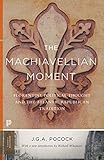The Machiavellian Moment : Florentine Political Thought and the Atlantic Republican Tradition / John Greville Agard Pocock.
Material type: TextSeries: Princeton Classics ; 93Publisher: Princeton, NJ : Princeton University Press, [2016]Copyright date: ©2017Description: 1 online resource (664 p.)Content type:
TextSeries: Princeton Classics ; 93Publisher: Princeton, NJ : Princeton University Press, [2016]Copyright date: ©2017Description: 1 online resource (664 p.)Content type: - 9780691172231
- 9781400883516
- HISTORY / Europe / General
- America
- American Constitution
- American Revolution
- American consciousness
- Anglicization
- Aristotle
- Arte della Guerra
- Britain
- C. H. McIlwain
- Christian thought
- Civil War
- Consiglio Grande
- Dialogo
- Discorsi
- Donato Giannotti
- England
- English Machiavellianism
- English political order
- European history
- European politics
- Federalism
- Florence
- Florentine government
- Florentine politics
- Florentine republic
- Florentine republican tradition
- Florentine thought
- Francesco Guicciardini
- Gasparo Contarini
- Giannotti
- Giovanni Cavalcanti
- Girolamo Savonarola
- God
- Guicciardini
- Harringtonian republicanism
- Il Principe
- Interregnum
- John Fortescue
- Leonardo Bruni
- Machiavelli
- Machiavellian moment
- Machiavellian republicanism
- Machiavellian thought
- Machiavellism
- Medicean rule
- Niccolo Machiavelli
- Niccolo Machiavellli
- Plato
- Renaissance political thought
- Renaissance
- Restoration England
- Ricordi
- Rome
- The Machiavellian Moment
- Venetian commonwealth
- Venetian politics
- Venice
- changes in perception
- citizenship
- civic consciousness
- civic humanism
- civic patriotism
- civic virtue
- classical republic
- commonwealth
- corruption
- eighteenth-century thought
- eschatology
- fortuna
- fortune
- historical change
- late antiquity
- medieval political thought
- military virtue
- mito de Venezia
- mixed constitution
- modernity
- neo-Machiavellian political economy
- ottimati
- parliamentary monarchy
- personality
- polis
- political apocalyptic
- political experience
- political innovators
- political particularity
- political thought
- prophecy
- providence
- providential time
- republic
- republican ideal
- republican ideology
- republican theory
- republican virtue
- secular particularity
- secular political self-consciousness
- social consciousness
- society
- temporal consciousness
- virt
- virtue
- vita activa
- vivere civile
- writings
- 320.1092 23
- JC143.M4
- online - DeGruyter
- Issued also in print.
| Item type | Current library | Call number | URL | Status | Notes | Barcode | |
|---|---|---|---|---|---|---|---|
 eBook
eBook
|
Biblioteca "Angelicum" Pont. Univ. S.Tommaso d'Aquino Nuvola online | online - DeGruyter (Browse shelf(Opens below)) | Online access | Not for loan (Accesso limitato) | Accesso per gli utenti autorizzati / Access for authorized users | (dgr)9781400883516 |
Browsing Biblioteca "Angelicum" Pont. Univ. S.Tommaso d'Aquino shelves, Shelving location: Nuvola online Close shelf browser (Hides shelf browser)

|

|

|

|

|

|

|
||
| online - DeGruyter The China Model : Political Meritocracy and the Limits of Democracy / | online - DeGruyter Teaching Plato in Palestine : Philosophy in a Divided World / | online - DeGruyter Not for Profit : Why Democracy Needs the Humanities - Updated Edition / | online - DeGruyter The Machiavellian Moment : Florentine Political Thought and the Atlantic Republican Tradition / | online - DeGruyter The Lives of Animals : The Lives of Animals [Princeton Classics] / | online - DeGruyter Politics and Vision : Continuity and Innovation in Western Political Thought - Expanded Edition / | online - DeGruyter The Hero's Fight : African Americans in West Baltimore and the Shadow of the State / |
Frontmatter -- CONTENTS -- INTRODUCTION TO THE NEW PRINCETON CLASSICS EDITION -- INTRODUCTION -- PART ONE. Particularity and Time -- I. The Problem and Its Modes -- II. The Problem and Its Modes -- III. The Problem and Its Modes -- PART TWO. The Republic and its Fortune -- IV. From Bruni to Savonarola -- V. The Medicean Restoration -- VI. The Medicean Restoration -- VII. Rome and Venice -- VIII. Rome and Venice -- IX. Giannotti and Contarini -- PART THREE. Value and History in the Prerevolutionary Atlantic -- X. The Problem of English Machiavellism -- XI. The Anglicization of the Republic -- XII. The Anglicization of the Republic -- XIII. Neo-Machiavellian Political Economy -- XIV. The Eighteenth-Century Debate -- XV. The Americanization of Virtue -- AFTERWORD -- BIBLIOGRAPHY -- INDEX
restricted access online access with authorization star
http://purl.org/coar/access_right/c_16ec
Originally published in 1975, The Machiavellian Moment remains a landmark of historical and political thought. Celebrated historian J.G.A. Pocock looks at the consequences for modern historical and social consciousness arising from the ideal of the classical republic revived by Machiavelli and other thinkers of Renaissance Italy. Pocock shows that Machiavelli's prime emphasis was on the moment in which the republic confronts the problem of its own instability in time, which Pocock calls the "Machiavellian moment."After examining this problem in the works of Machiavelli, Guicciardini, and Giannotti, Pocock turns to the revival of republican ideology in Puritan England and in Revolutionary and Federalist America. He argues that the American Revolution can be considered the last great act of civic humanism of the Renaissance and he relates the origins of modern historicism to the clash between civic, Christian, and commercial values in eighteenth-century thought.This Princeton Classics edition of The Machiavellian Moment features a new introduction by Richard Whatmore.
Issued also in print.
Mode of access: Internet via World Wide Web.
In English.
Description based on online resource; title from PDF title page (publisher's Web site, viewed 30. Aug 2021)


